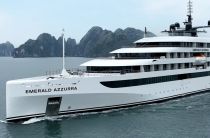Curieuse Island Seychelles
Cruise Port schedule, live map, terminals, news
Port Curieuse Island Seychelles cruise ship schedule shows timetable calendars of all arrival and departure dates by month. The port's schedule lists all ships (in links) with cruises going to or leaving from Curieuse Island Seychelles. To see the full itineraries (ports of call dates and arrival / departure times) and their lowest rates – just follow the corresponding ship-link.
| Day | Ship | Arrival | Departure |
|---|---|---|---|
| 16 December, 2026 Wednesday | |||
| 23 December, 2026 Wednesday | |||
| 30 December, 2026 Wednesday |
Curieuse Island (aka Ile Rouge) is a small island in Seychelles, located near the north coast of Praslin Island. Curieuse covers a total area of just 2,9 km2 (1,13 mi2) and population under 10. The isle is most famous with its bare red soil and the coco de mer palms. These trees are Seychelles' cultural icons and grow only on two islands in the world - Praslin and Curieuse.
Curieuse Island was originally named "Ile Rouge" because of its red-colored soil. The French claimed possession in 1768. They named the isle after the schooner ship "La Curieuse" - commanded by the explorer Marc-Joseph Marion du Fresne (1724-1772). Like a number of islands in Seychelles, Curieuse had a native giant tortoise population which was quickly destroyed.
Sailors set fire to the island in 1771, with the intention to make harvesting of coco de mer nuts much easier. The fire eliminated many of the native trees. Between 1829-1965, the island was used as a leper colony. . This helped to protect its ecosystem from human influence. Nowadays, ruins of the leprosarium still remain, as well as a former physician's residence at Anse St Joseph (today a museum and educational center).
A fire destroyed much of Curieuse's vegetation in 1967, including over 150 coco de mer palm trees. After this accident, the Seychelles government took ownership of the island and introduced various conservation and restoration projects.
In 1979, the island and the surrounding waters were declared "Curieuse Marine National Park" in an effort to protect native wildlife. Between 1978-1982, a conservation project moved a giant tortoise species to Curieuse from Aldabra. Today, the island is the home of over 300 Aldabra giant tortoises.
- Cruise Industry

Emerald Cruises introduces 16-day Safari and Seychelles Expedition
Emerald Cruises unveils an enticing 16-day "Safari and The Seychelles" expedition, now open for booking with sailings available from December 2024 to...
February 1, 2024 - Cruise Industry

Emerald Cruises to build a 2nd superyacht, Emerald Sakara
Emerald Cruises announced the company would build a second superyacht, Emerald Sakara, which is expected to enter the brand’s fleet in 2023...
September 29, 2021 - show more news
